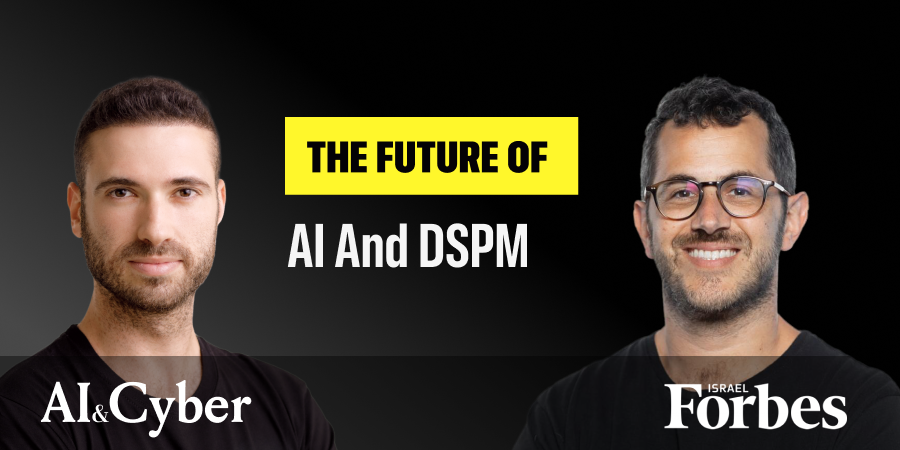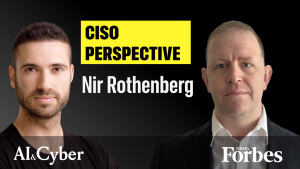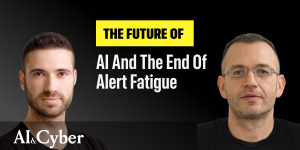By Michael Matias, CEO of Clarity and Forbes 30 Under 30 alum
The cybersecurity landscape is shifting rapidly, driven by advancements in artificial intelligence (AI) and significant changes in how data is managed across enterprises. My recent conversation with Dan Benjamin, VP at Palo Alto Networks and co-founder of Dig Security, reinforced my conviction: securing data and AI environments demands a fundamental shift from traditional, perimeter-focused cybersecurity strategies to dynamic, proactive security postures.
Dan Benjamin brings deep entrepreneurial expertise, having successfully founded and led multiple cybersecurity startups. Most recently, his startup, Dig Security, was acquired by Palo Alto Networks after just two years, reflecting rapid market recognition and adoption. His experience at Microsoft, combined with his current leadership role, uniquely positions him to address the intersection of AI and data security—an area increasingly critical to modern enterprises.
Benjamin emphasized a critical insight during our conversation: the importance of speed in cybersecurity innovation. “The ability to scale quickly and see immediately if something works or doesn’t work is critical,” he explained. “Entrepreneurs typically have limited patience—we need to see rapid progress.” This ethos guided Dig Security, enabling the company to scale from zero to nearly 80 employees in two years, driven by laser-focused product development and strategic clarity.
A crucial insight Benjamin shared revolves around the emergence of Data Security Posture Management (DSPM). Traditional cybersecurity approaches, such as perimeter-based defenses, have become insufficient as cloud data usage surpasses critical mass. Benjamin noted that when Dig Security began, “more than 50% of enterprise data had transitioned to the cloud, making legacy solutions obsolete.” DSPM addresses fundamental questions organizations face today: “What data do I have? Who accesses it? And is it adequately protected?” Benjamin emphasizes DSPM’s critical role, particularly as enterprises increasingly adopt multi-cloud strategies.
The shift toward cloud-centric data security was accelerated by simultaneous market education driven by venture capital investments and competing startups. According to Benjamin, “Initially, data security wasn’t even a top-ten concern for CISOs. Within a year, it became a top-three issue.” This rapid evolution underscores how quickly market dynamics can shift—and how rapidly enterprises must adapt.
This evolution is only intensified by AI. As Benjamin highlights, the integration of AI into business practices creates unprecedented security challenges. Enterprises face dual pressures: boards demand swift integration of AI capabilities for competitive advantage, while CISOs struggle to secure these rapidly adopted technologies. “AI security must begin with comprehensive visibility,” Benjamin notes. “Organizations must first understand which AI models they’re running, the data used to train them, compliance implications, and how to secure user access effectively.”
Today, approximately 50% of Palo Alto Networks’ data security conversations already revolve around AI security, underscoring its urgency. The broader industry trend is clear: AI isn’t merely reshaping cybersecurity threats; it’s reshaping cybersecurity strategies themselves.
Benjamin also sees AI playing a critical role in automating routine cybersecurity tasks, especially in Security Operations Centers (SOCs). AI-driven tools already perform initial threat investigations, dramatically reducing analyst workloads and improving efficiency. “Within five years, we’ll see fully autonomous AI security solutions making critical enterprise decisions,” he predicts.
This perspective resonates deeply with my own experiences at Clarity, where we’ve witnessed firsthand how proactive, AI-driven solutions effectively counter sophisticated cyber threats, such as deepfakes and AI-generated social engineering attacks. Benjamin’s insights underscore that cybersecurity must evolve beyond reactive alerts toward proactive and predictive AI-driven interventions.
The conversation left me convinced of one thing: enterprises must swiftly integrate DSPM and AI security strategies. Those slow to adapt will find themselves dangerously exposed in a landscape where threats evolve weekly. On the other hand, organizations that embrace AI-driven security postures will gain resilience and adaptability unmatched by traditional methods.
As Benjamin concluded, “Entrepreneurs have limited patience—we must see rapid progress.” This entrepreneurial urgency perfectly captures the spirit cybersecurity leaders need today to stay ahead of AI-powered threats and protect their organizations effectively.
Michael Matias is the CEO and Co-Founder of Clarity, an AI-powered cybersecurity startup backed by venture capital firms including Bessemer Venture Partners and Walden Catalyst. Clarity develops advanced AI technologies protecting organizations from sophisticated phishing attacks and AI-generated social engineering threats, including deepfakes. Before founding Clarity, Matias studied Computer Science with a specialization in AI at Stanford University and led cybersecurity teams in Unit 8200 of the Israel Defense Forces. Forbes Israel recognized him early on, naming him to the exclusive 18Under18 list in 2013 and the Forbes 30Under30 list thereafter. Matias authored the book Age is Only an Int and hosts the podcast 20MinuteLeaders.





